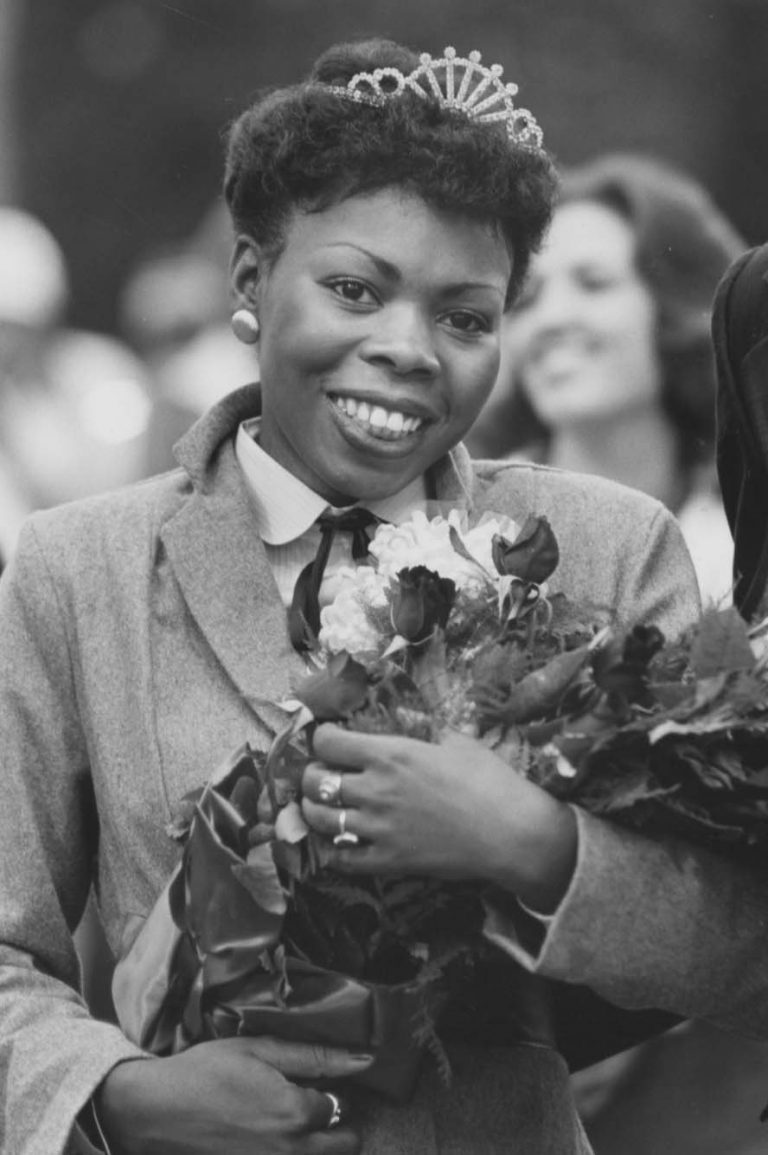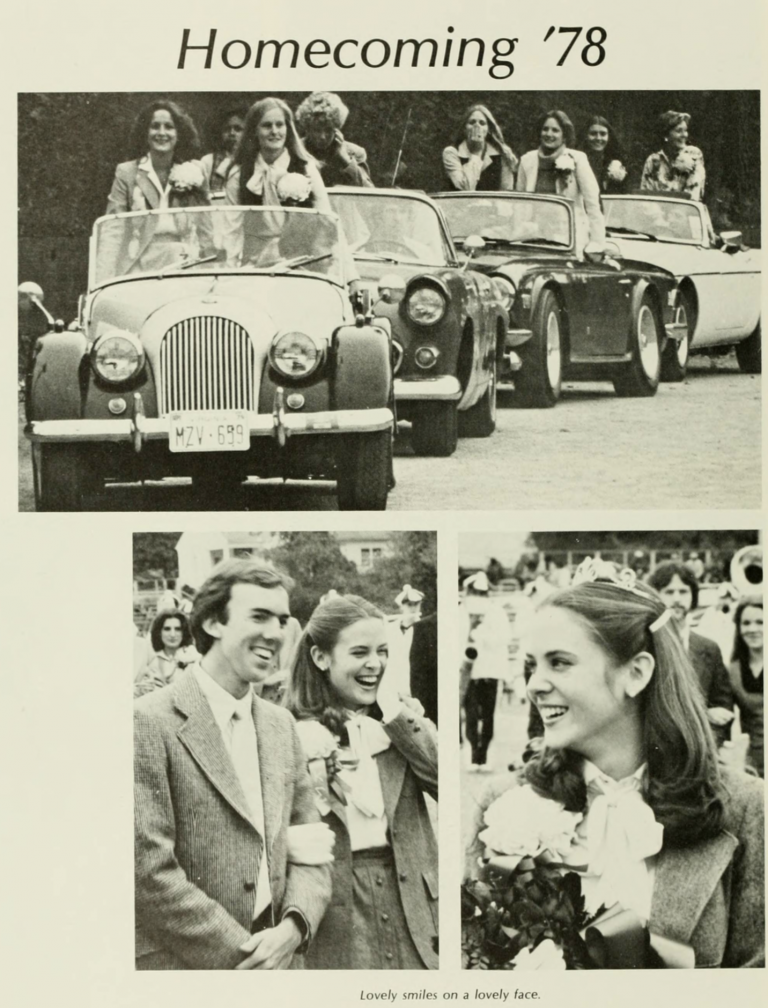Mary Carroll and BELONging
About Mary Carroll
Mary Carroll Robertson (nee Mary Carroll) arrived at Elon in fall 1977 and won election as Homecoming Queen in 1979. The practice of naming a Homecoming Court continues, but it was in full swing in the 1970s, and Carroll’s election was a high honor. Some white students, however, booed Carroll when she was crowned. Adding to the injury, white students editing the yearbook did not include the customary Homecoming spread in the 1980 edition. The school’s information officer explained that the students working on the yearbook had simply missed a deadline. Two Black students, James Strickland and Alonzo Craig, nonetheless burned their yearbooks in protest. Scores of other Black students followed their example. Not until 2019, did any representatives of Elon attempt to make amends.
Photo Gallery
Timeline
- 1963Glenda PhillipsGlenda Phillips becomes the first full-time Black student at Elon.
- 1964Civil Rights ActThe Civil Rights Act prohibits discrimination in education.
- 1968Black Studies ProgramBlack students join a coalition at San Francisco State University and successfully fight for a Black Studies Program (part of a new College of Ethnic Studies).
- 1969Eugene PerryEugene Perry becomes the first Black student to graduate from Elon.
- 1979Mary CarrollMary Carroll elected first Black Homecoming Queen in Elon History.
- 1980Phi Psi CliThe Phi Psi Cli (Elon Yearbook) does not include its traditional Homecoming spread. Students burn yearbooks, in a protest so substantial “Jet” magazine acknowledges it.
- 1980NAIA National ChampionsThe Elon football team wins back-to-back NAIA national championships in 1980 and 1981.
- 1983Vanessa WilliamsVanessa Williams is crowned the first Black Miss America (crowned in September for 1984 “reign”).
- 1992Eva ClaytonEva Clayton becomes first Black person elected to represent NC in the US House of Representatives since the Wilmington Race Massacre and white supremacy campaign of 1898, and the first-ever Black woman.
- 1994African and African American StudiesEstablishment of new minor at Elon: African and African American Studies
Sources
Primary Sources
- Phi Psi Cli (Elon Yearbook), Homecoming Spread (1978, 1980) – The 1979 student yearbook contained coverage of the 1978 Homecoming Court. There were no Homecoming photos in 1980, but the spread returned in 1981 (covering the 1980 Court). Notably, this Court included runner-up Nish Bynum and escort Ramon Jackson, both African American.
- “Black Queen Left Out: Students Burn Yearbooks,” Jet Magazine (June 19, 1980): 52. – Brief discussion of the yearbook burning, including the explanation by spokesman Tim McDowell that students simply missed a deadline.
- Joy Hamilton and Robin Adams, “The Unspoken Prejudice,” The Pendulum (March 5, 1981) – Hamilton and Adams mention Carroll as an indicator of Black success at Elon, even as they document and critique anti-Black racism among the predominantly white student body.
- Mary Carroll Robertson, Interviews by L’Tanya Richmond in “Elon’s Black History: A Story to Be Told” (Master’s Thesis, Duke University, 2004) – In this two-part interview, Carroll-Robertson recounts her day-to-day experiences as an Elon student.
- Krista Naposki, “Former student shares his experiences from the 70s,” The Pendulum (March 3, 2005) – Bryant Colson, first African American President of SGA, returned to campus for an interview and commented on Carroll’s composure when she did not appear in the yearbook.
- Robin Adams Cheeley, “Yes Elon, You Can Fix This,” Greensboro News and Record (November 19, 2019) – Cheely, a coauthor of the 1981 Pendulum letter above, wrote to describe and raise concerns about Mary Carroll Robertson’s return to campus in 2019 and her recognition at Homecoming.
Secondary Sources
- Joy Williamson, “In Defense of Themselves: The Black Student Struggle for Success and Recognition at Predominantly White Colleges and Universities,” Journal of Negro Education, 68, n. 1 (Winter 1999): 92-105. – Williamson offers a useful overview of the first two decades of integration of higher education, identifies institutional supports Black students sought “in defense of themselves,” and discusses the meaning of student success.
- Margaret M. Zamudio and Francisco Rios, “From Traditional to Liberal Racism: Living Racism in the Everyday,” Sociological Perspectives, 49, n. 4 (Winter 2006): 483-501. – Zamudio and Rios use student journals to document myriad encounters with racism (specifically the “liberal racism” that evolved on college campuses from the 1970s) and conclude “that the contemporary ‘colorblind’ discourse of the liberal era suggests an ongoing race project centered on the maintenance of white privilege.”
- Daniel Solorzano, Miguel Ceja,and Tara Yosso, “Critical Race Theory, Racial Microaggressions, and Campus Racial Climate: The Experiences of African American College Students,” Journal of Negro Education, 69, n. 1/2 (Winter-Spring 2000): 60-73. – This is an excellent discussion of microaggressions and the cumulative effect on the well-being of people of color and on campus climate more generally.
- Buffie Longmire-Avital and Ruthie Robinson, “Young, Depressed, and Black: A Comparative Exploration of Depressive Symptomatology Among Black and White Collegiate Women,” Journal of College Student Psychotherapy, 32, n. 1 (2018): 53-72. – Longmire-Avital and Robinson show the effect of “racial battle fatigue” on Black collegiate women and suggest reasons why Black women at predominantly white institutions might be less likely to seek help for depression.
In-Class Work
Any of the primary sources individually merits a close reading. Taken together, they offer good possibilities for in-class work. Examples include:
Plausible Deniability
COR Goals: Curiosity and Questioning, Global Perspective, Communication Skills, and Critical Thinking
Activity/Discussion Questions: Have students read in class two brief documents: the Jet Magazine discussion of the yearbook burning and the first full paragraph of Mary Carroll Robertson’s first interview with L’Tanya Richmond, in which she describes the immediate transfer of her roommate. Prepare for a class discussion by asking them to do an informal writing on the following questions: Do you think the yearbook editors intended to exclude Carroll because of her race? Do you think her first-year roommate transferred because of her race? What evidence do you have? Put yourself in Carroll’s shoes. How might dealing with these two events have been different if the white students had been more explicit about their anti-Black racism? If time allows, students may find the discussion more illuminating if they have first read one of the secondary sources about campus climate.
Common “Spaces,” White “Spaces”
COR Goals: Curiosity and Questioning, Global Perspective, Communication Skills, and Critical Thinking
Activity/Discussion Questions: A persistent theme in American life is the assumption of many white Americans that certain ostensibly common spaces or roles actually ought to be reserved for whites (sometimes this is referred to as “white normativity”). Mary Carroll encountered many situations in which she upended white Elon students’ assumptions that certain spaces or roles ought to be reserved for whites: her dorm room, the Homecoming Court, the yearbook, her classes, Greek Life, etc. Take the sensational event of the Homecoming and yearbook slights off of the table. Instead, have students read L’Tanya Richmond’s interviews with Carroll for homework and to identify ways in which Elon faculty or students communicated that certain aspects of the Elon experience were whites only. Work in groups to outline specific gatekeeping strategies whites used–as well as strategies to bring greater equity and inclusion.
Restorative Justice
COR Goals: Curiosity and Questioning, Global Perspective, Communication Skills, Critical Thinking, Problem Solving
Activity/Discussion Questions: Please read in class Robin Adams Cheeley’s op-ed, “Yes Elon, you can fix this” about Homecoming 2019. Emphasize that people of goodwill responded to Mary Carroll Robertson’s presence on campus with real generosity. Working in groups, conduct a postmortem of the event. What did Elon do well? What were opportunities to do better? Where do we go from here? Are there additional steps Elon ought to take to commemorate this series of events or to make things write (i.e., what would it look like to “fix” this?)? Have groups submit recommendations in the form of a memo to the Committee on Elon History and Memory.
Take-Home Assignments
Resilience
COR Goals: Research Skills, Broad Base of Knowledge, Communication Skills
Assignment: Mary Carroll’s is a story of both resilience and systemic racism. The secondary literature is clear about the cost of microaggressions on Black student health and success. This exercise is about teaching students to recognize Black resilience and to map concepts from the secondary literature onto specific situations. Please have them read all of the primary and secondary material; to identify coping strategies upon which Black students rely; and to find examples of Carroll implementing those strategies. This is not conceived as a formal research paper.
Contemporary Microaggressions
COR Goals: Curiosity and Questioning, Research Skills, Broad Base of Knowledge, Global Perspective, Communication Skills, Critical Thinking, Problem Solving
Assignment: Students ought to read all of the primary sources as well as some of the secondary literature on microaggressions (either the Solorzano, Ceja,and Yossoor article or instructor-provided) for this assignment requiring close observation of the contemporary campus. This is a sensitive assignment and one that might both engender unproductive conversations and produce a disproportionate burden for students of color if interviews are permitted. Instead, find a disciplinary-appropriate way for students to explore contested racial conventions and identify contemporary microaggressions: by keeping a journal of “field observations,” for instance; reading and noting the racial politics of the last five years of the student yearbook; reviewing microaggressions documented within Elon’s own media; etc. Output could take the form of the field notes or of a paper contrasting and comparing the experience of Black students in Mary Carroll’s generation to those of today.
Institutional Responsibility
COR Goals: Curiosity and Questioning, Research Skills, Broad Base of Knowledge, Global Perspective, Communication Skills, Critical Thinking, Problem Solving
Assignment: Elon has undertaken many initiatives to improve the climate for Black students in the 2000s, including the work of the Presidential Task Force on Black Student, Faculty, and Staff Experiences (cf. the spring 2019 report). More recently, the Elon Black Alumni Network has recommended additional steps. Evaluate these recommendations. Would they solve the problems Mary Carroll encountered? The problems described in the literature? What is missing?

